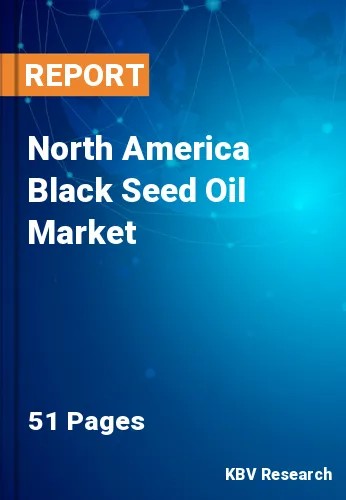The North America Black Seed Oil Market would witness market growth of 7.4% CAGR during the forecast period (2022-2028).
Black seed oil is beneficial to the immunological system. It possesses antihistamine and antimicrobial qualities, making it perfect for eczema, rashes, and even psoriasis treatment. Antihistamines appear to effect eczema, despite the fact that it is not a histamine condition. Plant acids and healthy fats abound in black seeds. This maintains the skin's lipid barrier intact and prevents it from drying out and peeling. According to other research, administering black seed oil topically to wounds accelerates wound healing, which might also help lessen blemishes and scarring. People can use black seed oil to maintain the skin healthy and shining in general.
The chemical thymoquinone found in black seed oil has been researched for its stimulating tissue growth and improve wound healing. Because of its antioxidant, anti-inflammatory, and antibacterial properties, thymoquinone has been reported to help cure burns, excisions, and diabetic wounds in animals. In one animal investigation, black seed extract greatly improved wound healing in diabetic rats when compared to a control group. Another animal study found that using black seed oil alone and in combination with honey helped rats heal faster and better. Additional research is needed to determine whether black seed oil and thymoquinone can also help humans heal wounds.
The FDA considers "black cumin (black caraway), Nigella sativa L." to be Generally Recognized as Safe (GRAS) for consumption as a spice, natural seasoning, or flavouring in the United States. Nigella is also allowed as an ingredient of dietary supplement products, that must notify the FDA within 30 days of marketing when a structure-function claim arises and be manufactured in accordance with current dietary supplement Good Manufacturing Practices (cGMPs). There is a growing trend of consuming or using organic products among the regional consumers.
Both the seed and the oil of Nigella sativa are regulated in Canada as therapeutic components in licensed natural health products (NHPs), which require pre-marketing approval from the Natural and Non-prescription Health Products Directorate. There are 85 licenced NHPs that list some type of N. sativa as an ingredient, with 78 listing it as a medical component and seven including it as a non-medicinal component. The rise in the consumption of black seed and black seed oil among the population of the region would open up lucrative opportunities for the regional market players during the forecast period.
The US market dominated the North America Black Seed Oil Market by Country in 2021, and would continue to be a dominant market till 2028; thereby, achieving a market value of $5,118.9 Thousands by 2028. The Canada market is experiencing a CAGR of 6.2% during (2022 - 2028). Additionally, The Mexico market would exhibit a CAGR of 9% during (2022 - 2028).
Based on Application, the market is segmented into Nutraceutical, Pharmaceuticals, Personal Care & Cosmetics, Flavoring & Dressing, and Culinary. Based on Product, the market is segmented into Oil, Powder, Tablets, & Capsules, and Soft Gel. Based on countries, the market is segmented into U.S., Mexico, Canada, and Rest of North America.
Free Valuable Insights: The Global Black Seed Oil Market is Estimated to reach $27.6 Million by 2028, at a CAGR of 7.6%
The market research report covers the analysis of key stake holders of the market. Key companies profiled in the report include Henry Lamotte Oils GmbH, FLAVEX Naturextrakte GmbH, The Kerfoot Group Limited, Life Extension Foundation Buyers Club, Inc., NuVerus Corporation, BioPrep Solutions, Perrigo Company PLC, TriNutra, Ltd., Sabinsa Corporation, and ConnOils LLC.
By Application
By Product
By Country
Our team of dedicated experts can provide you with attractive expansion opportunities for your business.

